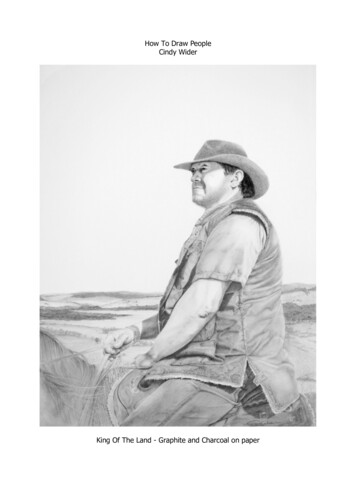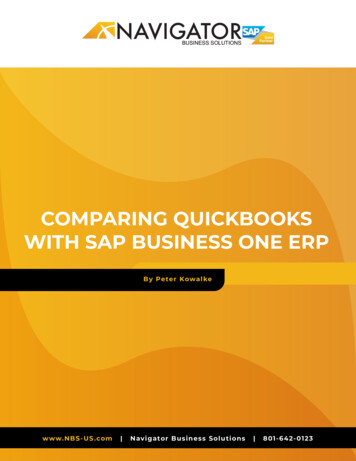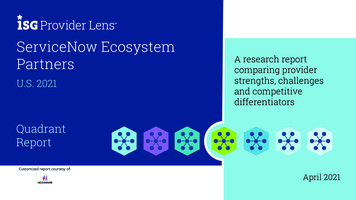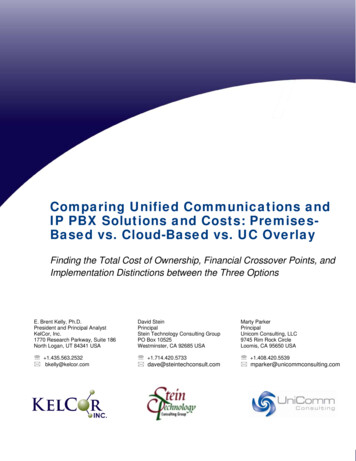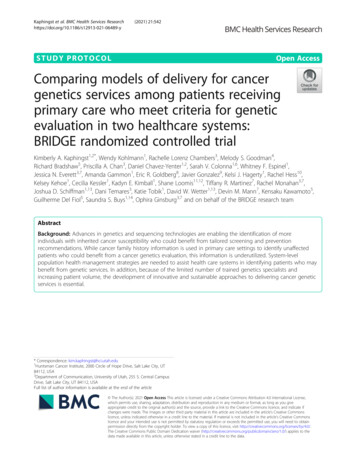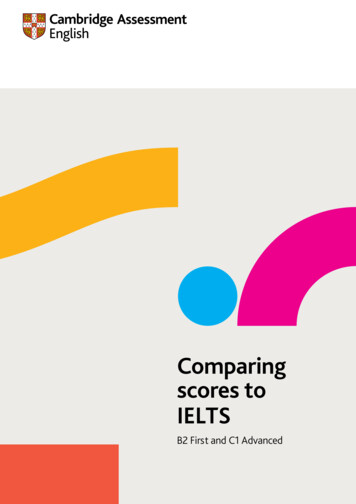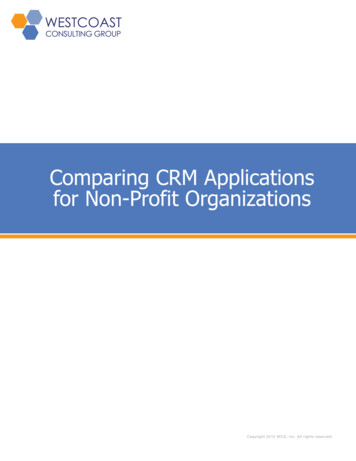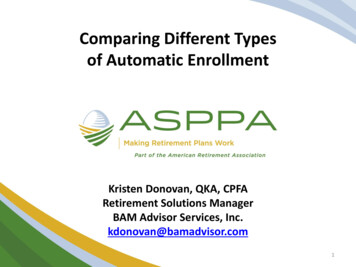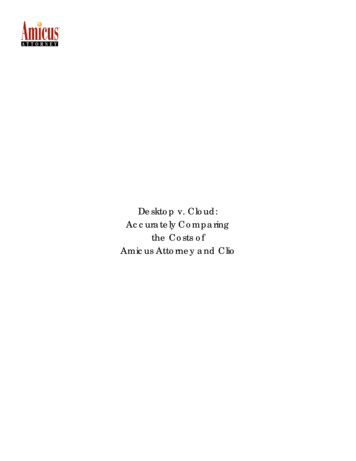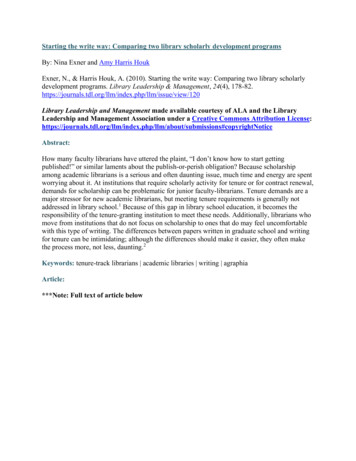
Transcription
Starting the write way: Comparing two library scholarly development programsBy: Nina Exner and Amy Harris HoukExner, N., & Harris Houk, A. (2010). Starting the write way: Comparing two library scholarlydevelopment programs. Library Leadership & Management, 24(4), issue/view/120Library Leadership and Management made available courtesy of ALA and the LibraryLeadership and Management Association under a Creative Commons Attribution /about/submissions#copyrightNoticeAbstract:How many faculty librarians have uttered the plaint, “I don’t know how to start gettingpublished!” or similar laments about the publish-or-perish obligation? Because scholarshipamong academic librarians is a serious and often daunting issue, much time and energy are spentworrying about it. At institutions that require scholarly activity for tenure or for contract renewal,demands for scholarship can be problematic for junior faculty-librarians. Tenure demands are amajor stressor for new academic librarians, but meeting tenure requirements is generally notaddressed in library school.1 Because of this gap in library school education, it becomes theresponsibility of the tenure-granting institution to meet these needs. Additionally, librarians whomove from institutions that do not focus on scholarship to ones that do may feel uncomfortablewith this type of writing. The differences between papers written in graduate school and writingfor tenure can be intimidating; although the differences should make it easier, they often makethe process more, not less, daunting.2Keywords: tenure-track librarians academic libraries writing agraphiaArticle:***Note: Full text of article below
Starting the Write Way:Comparing Two Library Scholarly Development ProgramsNina Exner and Amy Harris HoukHow many faculty librarians have uttered the plaint, “Idon’t know how to start getting published!” or similarlaments about the publish-or-perish obligation? Becausescholarship among academic librarians is a serious andoften daunting issue, much time and energy are spent worrying about it. At institutions that require scholarly activityfor tenure or for contract renewal, demands for scholarshipcan be problematic for junior faculty-librarians. Tenuredemands are a major stressor for new academic librarians, but meeting tenure requirements is generally notaddressed in library school.1 Because of this gap in libraryschool education, it becomes the responsibility of the tenure-granting institution to meet these needs. Additionally,librarians who move from institutions that do not focus onscholarship to ones that do may feel uncomfortable withthis type of writing. The differences between papers written in graduate school and writing for tenure can be intimidating; although the differences should make it easier, theyoften make the process more, not less, daunting.2Although tenure for academic librarians has a long history of debate and research, there is less overall discussionof the role of publication for tenure-seeking librarians.3Unsurprisingly, the tenure process is a proven motivatorfor publication among librarians.4 But beyond that, finding ways to support and promote scholarship—especiallyamong new librarians—is a more complicated question.Literature ReviewOnly a modest body of research exists on promoting librarians’ scholarly efforts in academic libraries. Some individual techniques that can help with publication have beenstudied or discussed in editorials and books. For example,studies of journal acceptance have found that choosing ajournal that matches the topic is a critical step. In addition,good writing and interest in the topic is vital as well.5 AndNina Exner (ninae@ncat.edu) is Reference Librarian at NorthCarolina Agricultural and Technical State University in GreensboroAmy Harris Houk (amy harris@uncg.edu) is Information LiteracyLibrarian at the University of North Carolina at Greensboro.178finally, perhaps most important of all, the writer shouldunderstand the peer review process before submitting anarticle. In many ways, this process is easier and more collaborative than classroom work.6 But as helpful as it is, thissort of advice is targeted toward the individual librarianand does not address what can be done by colleagues, mentors, or administrators to help support the development ofscholar-librarians.At the institutional level, several factors have beenshown to encourage scholarship. Institutional commitmentis a major factor, as long as that commitment includesconcrete support mechanisms like release time or on-thejob writing time.7 It is worth noting that in and out oflibrarianship, time pressures are one of the most commonlymentioned concerns that need to be addressed administratively.8 Without serious administrative support, librarianswill never have the ability to make the leap to becomescholar-librarians. High levels of success have been foundby intensive, multi-pronged approaches addressing scholarly training, research equipment, information, and releasetime.9 But unfortunately such an exhaustive approachmay be a more serious commitment to developing scholarlibrarians than many libraries have the ability to engage in.More modest approaches are needed for libraries with moremodest resources at hand.Mentoring programs are also important contributorsto scholarly success in libraries.10 But there are times whenmentoring may not be enough, or the mentoring programmay need some added support. Mentoring by senior librarians is a widely subscribed to method of supporting juniorlibrarians, but when new programs fall outside of mentors’realms of experience, alternatives may be needed. At thosetimes collegial review11 and informal or formal AcademicWriting Groups12 have been used with success to helpencourage librarians in scholarly writing. This is not onlytrue among librarians. Because many institutions and fieldsemphasize scholarship as the most important criterion forevaluation of merit for tenure, productivity is an issue formany scholars.13 Other disciplines have found success withpeer writing support groups, whether in individual disciplines or cross-disciplinarily.14 Collegial writing support canhelp encourage scholarly productivity.It seems potentially interesting, therefore, to look atthe comparative traits of different types of collegial writingLibrary Leadership & Management
groups. Different cultures and institutions have differentneeds, and it is certain that there can be no “one size fitsall” solution for creating support for academic writingand scholarly productivity. This article looks at two different approaches to supporting librarians at two differentinstitutions.The Two InstitutionsThe University Libraries at the University of NorthCarolina at Greensboro (UNCG) and the F. D. BlufordLibrary at North Carolina Agricultural and TechnicalState University are both part of the University of NorthCarolina system and are located in Greensboro, NorthCarolina. While not all UNC-system libraries grant tenureto librarians, both the University Libraries and BlufordLibrary have faculty-status librarians on the tenuretrack. Schools in the UNC system have a large amountof autonomy in their governance. Eight of the seventeeninstitutions in the system have tenure-track librarians.The University Libraries at the UNCG is made upof Jackson Library, the main library, and the MusicLibrary, a branch located in the School of Music. Alllibrarians at the University Libraries are tenure-track,except one resident librarian, who has a two-year fixedterm appointment. There are currently fourteen tenuredand fourteen tenure-track librarians. Librarians at UNCGhave had faculty status and been tenure-track since 1976and participate fully in faculty governance. UNCG hasan FTE of just over fifteen thousand with more thanone hundred undergraduate, sixty-three masters, andtwenty-five doctoral programs. UNCG has a Departmentof Library and Information Studies, housed in theSchool of Education. The Carnegie Foundation has designated UNCG a Doctoral/Research-Intensive University.15Jackson Library features a reference desk, which is staffedapproximately fifty-six hours per week by librarians fromreference and other departments, fourteen hours bylibrary staff and seventy-two hours by graduate studentinterns (some of which overlap with librarians and staff).Reference librarians also teach between three hundredfifty and four hundred library instruction sessions eachacademic year.Librarians at the University Libraries are appointed toan initial four-year term. After two years, the tenure-tracklibrarian goes up for reappointment. If reappointment isgranted, the librarian is granted an additional three-yearterm and seeks tenure after five years of employment.Reappointment and tenure are based on four criteria: professional responsibility/teaching effectiveness, researchand creative activities, service activities, and directed professional activities. In the past, professional responsibilitywas the main focus of reappointment and tenure decisions, but in recent years, research and creative activitieshas become more important.24, no. 4Fall 2010The F. D. Bluford Library is a medium-sized academiclibrary with nine currently tenured and five tenure-tracklibrarians. Bluford Library serves North Carolina A&TState University (NC A&T), a PhD-granting HBCU institution with an FTE just under ten thousand. NC A&T hasa Carnegie Classification of “High Research Activity”and offers 116 undergraduate, 54 master’s, and 5 doctoral programs. Like the University Libraries at UNCG,the service model at Bluford is highly patron-centered;there are three service desks, including a reference deskstaffed approximately ninety-five hours per week duringthe academic year by librarians only. Desk and classroomtime take up the vast majority of public service librarians’days. Technical, systems, and administrative services arelikewise stretched thin, which leaves little time for scholarly pursuits.In the past, librarians have been granted tenurewithout extensive scholarly publications by demonstrating intense classroom and student-centered professionalwork. Tenure applications have always included service,professional activity, and/or scholarly presentations, butcampus standards are increasingly strict. Because newcampus standards for tenure demand more rigorous scholarly requirements, library tenure standards have becomemore rigorous as well. The just-revised tenure requirements demand authorship of a scholarly work (broadlydefined), as well as scholarly presentation or high-levelservice in professional organizations. Therefore, scholarlypublishing is becoming an increasingly serious concernfor faculty-librarians at the Bluford Library.Mentoring programs at both institutions provide support to tenure-track librarians. At the University Libraries,each new librarian is matched with a tenured librarianfrom another department within the library. This mentor is charged with helping the tenure-track librarianfind opportunities for presenting and publishing, as wellas assisting with the preparation of reappointment andtenure documents. The mentoring program also featuresa monthly Lunch ’n Learn component, where participantsmeet over lunch and listen to a presentation on a professional development topic. In the past, these topics haveincluded copyright issues and funding opportunities fortravel. Mentees find this program, which has been in existence since 2005, beneficial, but, because of the increasedattention paid to publication, many of the mentors whohave been tenured for many years know little about scholarly publishing.At Bluford, the mentoring program is likewise focusedon helping junior faculty-librarians achieve tenure. Asalready mentioned, senior (tenured) librarians at Blufordusually have considerable experience in professional service. But many of the senior librarians lack experience inscholarly writing because it has not been mandated untilrecently. Many tenured librarians have experience in partsof the publishing process. A few have written individualarticles, both refereed and non-refereed, and others have179
served as referees or editors. However, participation inthis process is not consistent among tenured librarians.So in both libraries, mentoring exists but many mentorslack the experience in scholarly writing that would helpthem encourage and support their mentees.Tenure-track librarians at both institutions havefound that they need support beyond what is provided bythe mentoring programs to achieve the level of scholarlypublishing necessary for tenure, which has lead to thecreation of writing groups for tenure-track faculty. Thetenure-track librarians themselves formed these groupsbecause they felt they needed the support. But the groupstook two different routes, each with advantages and disadvantages.The Pub & Grub ModelBluford Library’s academic writing group is based onan informal exploration and mutual support model. Thegroup, called the “Pub & Grub,” meets during the lunchhour to discuss issues of mutual interest and to write. Itis an opt-in group with little structure. Summer meetingsare held weekly to help encourage more intense writingwhen hours (and therefore desk duties) are shorter andthe instructional schedule is less demanding. Althoughthere is considerable work to be accomplished in the summer, the time is more flexible.The first attempt at such a group was in 2005 andformed to encourage scholar-librarians at the Blufordlibrary. Growing concerns over publishing arose in ameeting of the library faculty, because of early discussion about more stringent requirements for scholarshipon campus. A few individuals—a mix of new tenure-tracklibrarians, near-tenure librarians, and senior librarians—wanted to do something to address the concerns. This ledto the formation of a scholarly development task force,which engaged in a number of activities including theposting of “Call for Paper” announcements on the libraryIntranet, collecting paper topics and matching coauthors,and offering peer review to give feedback on papers orpresentations. This task force gave feedback on some presentations, but no librarians were able to really harnessthe task force for publishing. The task force ultimatelywas unable to settle on a formula to encourage scholarship. By 2009 there had been no activity by this task forcefor well over a year. But new campus guidelines—now areality, not simply a discussion—along with an influx ofnew tenure-track librarians increased the need for publishing support. This led to a great deal of discussionand concern among librarians, especially tenure-tracklibrarians who were not certain where to begin. Theresult was that one tenured librarian with a little publishing experience decided that a support group might beworth starting. Junior faculty suggested that a casual,discussion-based forum would be better than a task force.180With the success of the library’s lunchtime book discussion group, the formation of another lunchtime group forscholarly discussion seemed to have general appeal.The group initially met to discuss its goals. Theydetermined that librarians needed support in severalareas. The most common issues facing these tenure-tracklibrarians were: lack of time available to write, not knowing what to write about, a lack of practical experiencewith the peer-review process, and the inability to usecitation-management software. Most of the participantsfaced more than one of these issues.The Pub & Grub group decided to start with a facilitated problem-solving approach. The first few meetingsstarted with general information about the experiences ofthe published librarians and those who knew the journaleditorial process best, in order to familiarize everyonewith the peer-review process. Then the writing processbegan. First, each member came up with at least onetopic, which was discussed as a group. The next severalsessions were spent tweaking and adjusting topics andoutlining.Soon it became clear that it was time to write. Buta lack of time to write was still the biggest obstacle: thegroup tried to separate and say they would write duringthe week, but most did not get far. So when there arenot many topics for discussion, the rest of the lunch timeis spent writing. This way there is some quiet time forwriting, but writers also have access to others when theyneed advice.The Agraphia Group ModelJackson Library’s academic writing group is inspired byand based on the agraphia group described by Paul Silviain his book How to Write a Lot: A Practical Guide toProductive Academic Writing. He aims to help people inacademia become more productive writers. Silvia stressesthe importance of making writing routine. He suggestsscheduling time to write in the same way one schedules ameeting and sticking to it. Silvia spends an entire chapterdebunking common excuses that keep people from beingproductive writers and provides specific advice on writingarticles and books.16The interest in this model began when a tenure-tracklibrarian who is involved in a campus-wide New FacultyMentoring Program received a copy of Silvia’s book. Sheshared it with an administrator, who purchased copies ofthe book for each tenure-track librarian. Upon readingthe book, some of the tenure-track librarians decided toform an Agraphia Group, which Silvia discusses in hisbook. Participation in this group is optional and open toall tenure-track librarians. The word “agraphia” means theloss of the ability to write, which Silvia felt an appropriate name for his group. Silvia’s group meets weekly, andeach member of the group sets measurable goals (suchLibrary Leadership & Management
as words written, articles read, and so on), which onemember writes in a notebook. At the next meeting, eachmember tells whether or not they met their goal from theprevious session and sets new goals for the next week.17Some examples of writers’ goals are as follows: write fivehundred words, create an outline, research places to submit an article, and write and submit a presentation proposal. The members of the University Libraries AgraphiaGroup decided to meet every other week because thelibrarians do not have enough time for writing everyweek to necessitate meeting more frequently. On average,seven librarians attend each thirty minute meeting. Oncea librarian has shared his or her goals, there is oftendiscussion about whether a goal can be accomplishedin two weeks, or if a goal is truly measurable. It is helpful to receive this type of feedback from colleagues.Additionally, some of the group members would likeadditional time to discuss ideas for writing. This will likelyoccur after the Agraphia Group meeting for those whowish to participate. The participating librarians have alsodecided to peer edit each other’s drafts. When someonefinishes a draft, they will send an e-mail out to the groupasking if someone can edit it. People who have time to doso will read the draft and make comments.Advantages and DisadvantagesEach approach has positives and negatives. One advantage to both approaches is increased motivation and confidence. Being part of a shared experience and having asupport group to turn to not only helps participants keeptheir writing in the forefront of their mind, but also helpsthem feel that they are not alone.In the Agraphia Group, goals are discussed as agroup and recorded, which proves an element of accountability. There is no penalty for not meeting one’s goals,but the members are motivated to meet goals so thatthey do not have to admit to the group that they wereunsuccessful. Thus far, this has been sufficient motivation for the group. The Agraphia approach takes up littleface-to-face time, so members are more likely to make itto meetings. It is goals focused, which is an advantage inmaking real progress. It is hoped that this fusio
School of Education. The Carnegie Foundation has desig-nated UNCG a Doctoral/Research-Intensive University.15 Jackson Library features a reference desk, which is staffed approximately fifty-six hours per week by librarians from reference and other departments, fourteen hours by library staff a
